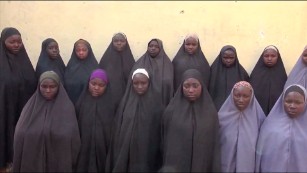
Abuja, Nigeria – The Nigerian Senate demanded updates from the nation’s security agencies on attempts to rescue girls abducted from the town of Chibok two years ago.
Lawmakers voted unanimously Friday to have leaders of security agencies brief the Senate on the efforts made to date.
The move follows the reporting by CNN of a proof-of-life video showing 15 of the girls.
“With the video and other things brought in, we need the security agents to brief us on what they have been able to achieve,” Sen. Shehu Sani told CNN by phone Friday.
“We expect the security chiefs to speak to the Senate early next week,” he said.
Sani was the first Nigerian senator to comment on the proof-of-life video, calling it credible during an interview on CNN’s Christiane Amanpour.
Asked Friday why the security chiefs had not appeared before the Senate at any point in the last two years, Sani told CNN by phone that the government’s focus had been on military action against Boko Haram, the terrorist group thought to be responsible for the kidnapping.
The military has succeeded in rescuing hundreds of women and girls, but CNN’s video has now given the Senate renewed impetus and added “a new dimension,” Sani said.
CNN’s reporting of the Chibok girls’ proof-of-life video “makes clear” that the kidnapping was not a hoax, and that the girls had not been killed, “or sold as sex slaves” according to the Nigerian senator.
Senators have also pledged to rebuild the school in Chibok, which still sits in disrepair.
The footage broke hearts worldwide, underlining the suffering of the Chibok mothers — and the plight faced by their daughters.
Mother overcome by proof of life video
Images of a broken Rifkatu Ayuba who recognized her daughter, Saratu, in the video produced by her captors — and obtained exclusively by CNN — prompted renewed outrage over the 2014 kidnappings.
From protesters marching in Nigerian cities to social media users in distant countries raising their voices, the story stirred fresh outpourings of anger and frustration at the atrocity, and the official response.
How was it that two years after Boko Haram kidnapped 276 girls from their school dormitory, Nigeria and the global community — which had expressed its determination to #bringbackourgirls — had failed to rescue the 219 still missing?
And why had the Nigerian government — believed to have been in possession of the video since January — failed to inform the families of the girls it had the film, the first glimmer of hope their daughters were still alive?
The video, obtained by CNN and showing 15 girls in robes identifying themselves, is believed to have been made in December during negotiations between the government and parties claiming to represent Boko Haram.
Shot on Christmas Day, it was released by someone eager to give the girls’ parents hope that some of their daughters were still alive, and to prompt the government to help secure their release.
Two of the three women to whom CNN screened the footage recognized their daughters; a third was distressed that it did not show her daughter.
A classmate of the missing girls also identified several of the teens in the footage.
As reported by CNN
